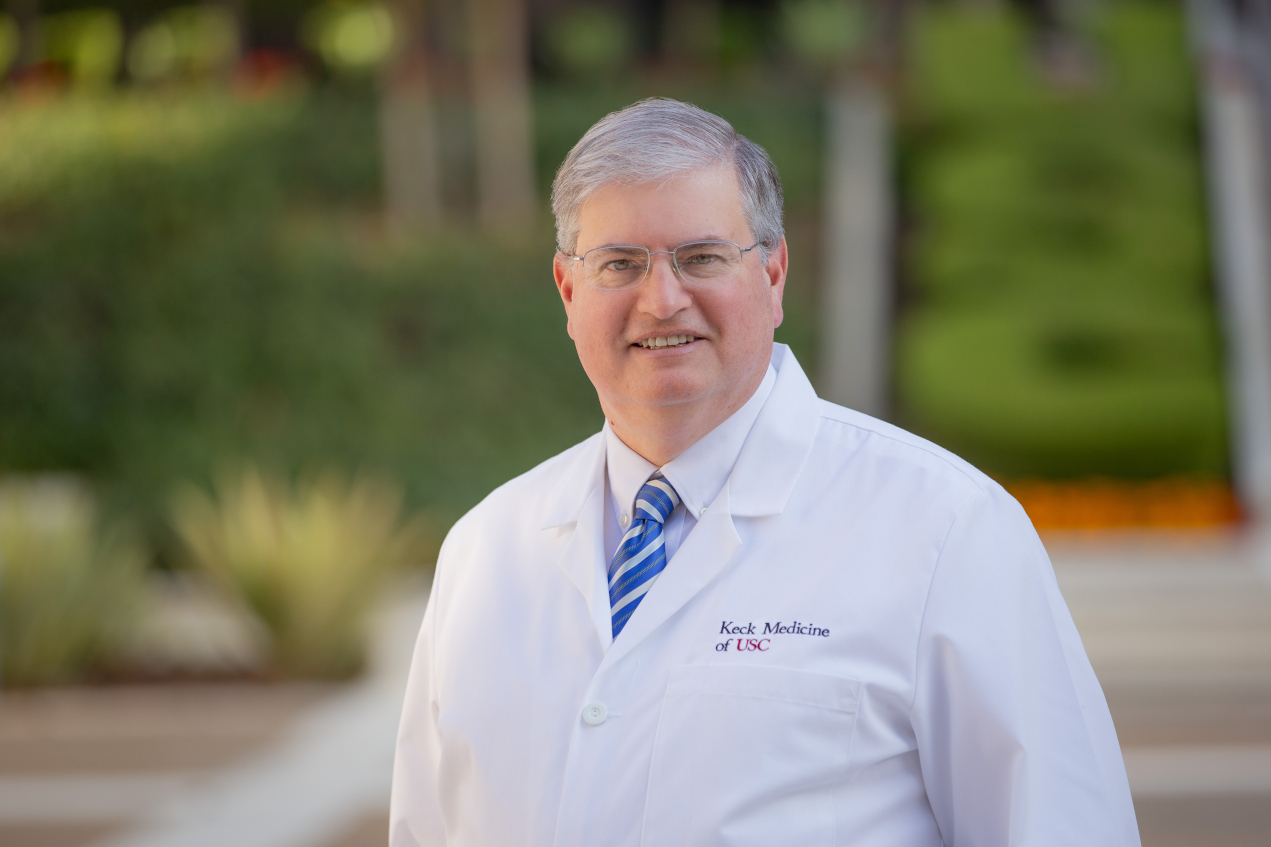Orthopaedic oncologist J. Dominic Femino, MD, is an associate professor of clinical orthopaedic surgery and chief of musculoskeletal oncology at the Keck School of Medicine, and is leading the USC Sarcoma Program at Keck Medicine of USC.
In an interview with HSC News, Femino discussed his goals for taking orthopaedic oncology and sarcoma care to the next level.
What do you like best about the practice of orthopaedic oncology?
Orthopaedic oncology allows me to tackle very complex problems, which I enjoy. The types of surgeries we perform require me to be inventive, reconstructing limbs in different ways after cancer resection. Every surgery is different because every tumor is different, and I enjoy the creativity of the surgery.
I also really enjoy the long-term relationships I have with my patients in orthopaedic oncology. After cancer surgery and reconstruction, we generally follow a patient for a very long time — or even a lifetime — to make sure they are doing well. I like that long-term relationship, which does not always exist in other orthopaedic subspecialties. In those subspecialties, a patient may undergo orthopaedic surgery for trauma or a sports injury, and once healed, those patients are off and there is no long-term follow-up.
What led you to Keck Medicine of USC?
I was very impressed by the support and vision of Keck Medicine’s administration, as well as its orthopaedic surgery and medical leaders, to grow the sarcoma program significantly here. Keck Medicine has tremendous resources to create a multidisciplinary program that is both active in research and in increasing patient volume, especially sarcoma cases.
How will the evolving sarcoma program ensure Keck Medicine offers the most advanced care?
To provide cutting-edge care, you need an entire team of people. Keck Medicine has been committed to developing and growing that team. The sarcoma program will be able to address sarcomas or cancers that involve both the soft tissues and bone in all age groups. I also look forward to treating an even higher volume of metastatic bone diseases in patients whose organ carcinomas have spread to the bone. We will be able to address these diseases with the multidisciplinary care they require, including radiation, chemotherapy, targeted therapy, immunotherapy and surgery.
We will focus on unique, minimally invasive surgical interventions to not only ablate a lesion but also to support and reconstruct bone defects using the patient’s own bone. We are also able to use unique prosthetic devices to reconstruct not only large segments of bone but large segments of bone and joints together, as well as soft tissue reconstructions using allograft soft tissues.
Finally, we have the ability to enroll patients in clinical trials, giving them access to innovative medications and surgical and radiation treatments for their sarcomas.
This is just some of what we can offer as a large program with large volume.
What are your top goals for the sarcoma program in the next few years?
Because sarcomas are so rare, there are not many medical oncologists or orthopaedic surgeons who treat these types of diseases. Patients usually are best treated at a sarcoma center such as ours here at Keck Medicine. Almost all of our patients are referred in from elsewhere.
Our goal is to develop a seamless transition for patients so that referring providers have easy access when they need help with a sarcoma patient. Ensuring that people can find us easily and can transition smoothly to our program is critical.
Once the patient is here, our primary goal is to provide the best possible care we can. Each patient has very specific needs, and every individual’s needs are different. We aim to listen to the patient to understand their treatment goals and provide the best possible outcomes.
In the long-term, my goal is to develop a pathway to allow a patient who comes in with a brand-new tumor to get a diagnosis and treatment plan completely confirmed, with final pathology, within seven days of presenting to us at Keck Medicine. It is important for patients to be able to get an exact diagnosis of their tumor, what stage it is in and what the treatment plan is. Typically, that can take weeks, particularly when care is disjointed and not conducted at one single sarcoma center. In those cases, communication between providers can become belabored and sometimes delay patient care. If we can provide all that in a very swift fashion, it’s great for the patient’s peace of mind. They will know they are at a place where they can get a prompt and accurate diagnosis, workup and treatment plan in place.
What do you like to do in your spare time?
I do a lot of volunteer work with the Boy Scouts of America. I enjoy mentoring youth. I also have two young-adult children living away at college right now, and I like to spend time with them as much as possible. My wife and I enjoy outdoor activities as well.
— Jennifer Grebow


